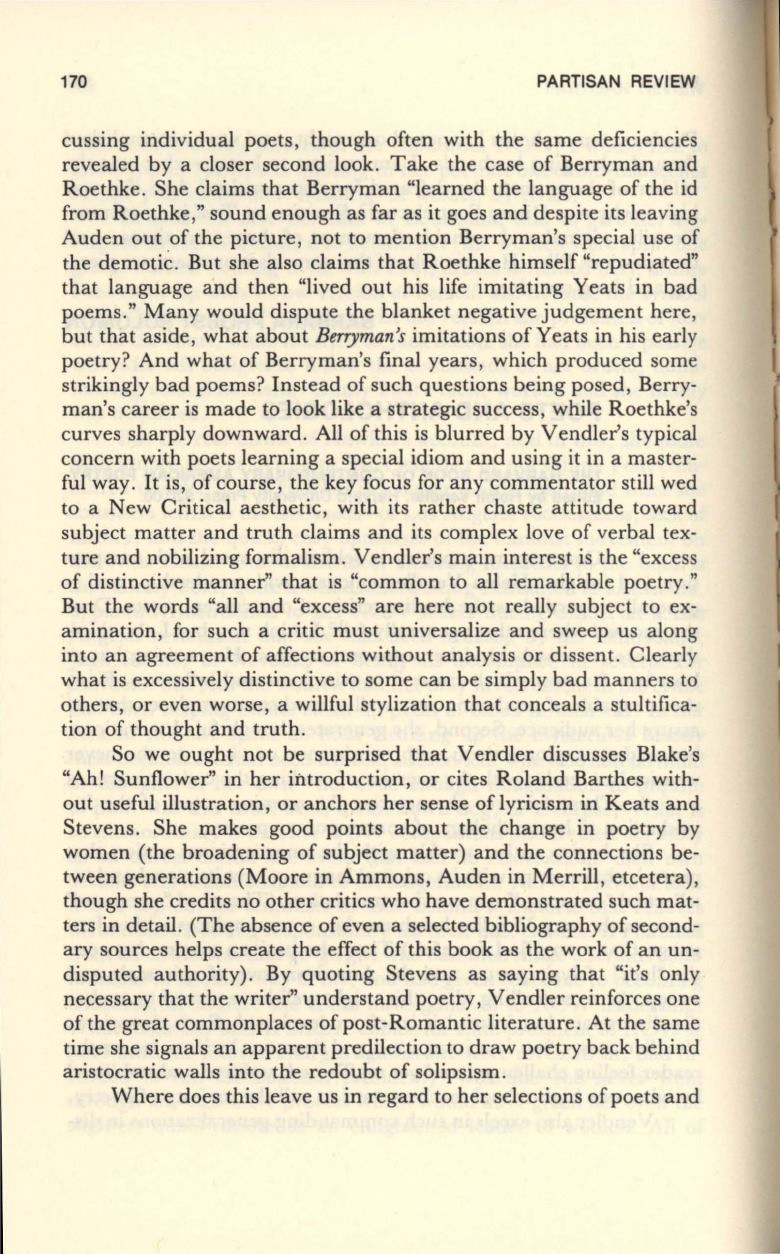
170
PARTISAN REVIEW
cussing individual poets , though often with the same deficiencies
revealed by a closer second look. Take the case of Berryman and
Roethke . She claims that Berryman "learned the language of the id
from Roethke," sound enough as far as it goes and despite its leaving
Auden out of the picture, not to mention Berryman's special use of
the demotic. But she also claims that Roethke himself "repudiated"
that language and then "lived out his life imitating Yeats in bad
poems." Many would dispute the blanket negative judgement here,
but that aside, what about
Berryman's
imitations of Yeats in his early
poetry? And what of Berryman's final years, which produced some
strikingly bad poems? Instead of such questions being posed, Berry–
man's career is made to look like a strategic success , while Roethke's
curves sharply downward. All of this is blurred by Vendler's typical
concern with poets learning a special idiom and using it in a master–
ful way.
It
is, of course, the key focus for any commentator still wed
to a New Critical aesthetic, with its rather chaste attitude toward
subject matter and truth claims and its complex love of verbal tex–
ture and nobilizing formalism. Vendler's main interest is the "excess
of distinctive manner" that is "common to all remarkable poetry."
But the words "all and "excess" are here not really subject to ex–
amination, for such a critic must universalize and sweep us along
into an agreement of affections without analysis or dissent. Clearly
what is excessively distinctive to some can be simply bad manners to
others, or even worse, a willful stylization that conceals a stultifica–
tion of thought and truth.
So we ought not be surprised that Vendler discusses Blake's
"Ah! Sunflower" in her introduction , or cites Roland Barthes with–
out useful illustration, or anchors her sense of lyricism in Keats and
Stevens . She makes good points about the change in poetry by
women (the broadening of subject matter) and the connections be–
tween generations (Moore in Ammons, Auden in Merrill, etcetera),
though she credits no other critics who have demonstrated such mat–
ters in detail. (The absence of even a selected bibliography of second–
ary sources helps create the effect of this book as the work of an un–
disputed authority) . By quoting Stevens as saying that "it's only
necessary that the writer" understand poetry, Vendler reinforces one
of the great commonplaces of post-Romantic literature. At the same
time she signals an apparent predilection to draw poetry back behind
aristocratic walls into the redoubt of solipsism.
Where does this leave us in regard to her selections of poets and


